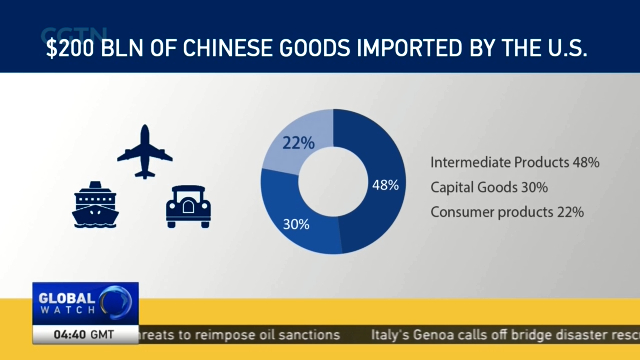
13:34, 20-Aug-2018
China-US Trade Frictions: American consumers to pay the price if latest tariff takes effect
Updated
12:57, 23-Aug-2018
02:24

A 25% levy on certain Chinese goods imported by the US is open to public comment until the end of August. With a public hearing scheduled for this week, some are starting to see the negative effects of potential tariffs. CGTN's Zhao Yunfei has the details.
Higher tariffs may be on the way for Chinese goods. Just three weeks after Washington issued a list of items facing 10 percent tariffs, the figure is now up to 25 percent on certain Chinese goods valued at 200 billion US dollars.
Among them, 48 percent fall into the intermediate goods category. Capital goods account for 30 percent. And consumer products, 22 percent. Over one-fifth of the goods in question may cost additional charges that directly burden American consumers.
PROFESSOR JOHN GONG UNIVERSITY OF INTERNATIONAL BUSINESS AND ECONOMICS "Such as food, electronics, textiles, toys, all of these that are usually purchased by middle-class people, these are the costs that could really pass on American people, and they'll have to pay a price."
Experts say the tariffs would increase total annual costs for the average American family to 127 dollars, if companies pass the entire additional fees onto consumers.
But the overall impact will be much higher. Some products on the list, such as wood wares, furnitures and knitted fabrics are what the United States relies heavily on China for. And for China, the industry that will be hit hardest is high-end manufacturing.
PROFESSOR JOHN GONG UNIVERSITY OF INTERNATIONAL BUSINESS AND ECONOMICS "I think it is important to come to the negotiating table to work out some deals. The point is that some of the things, especially the structural changes the US government is requesting as contained in a lot of acquisitions in the section 301 report are actually beneficial to our own reform and opening up agenda. I'll give you an example, the intellectual property protection is certainly in Chinese government's interests."
ZHAO YUNFEI BEIJING "China has reiterated that it does not want a trade war, but is also not afraid of one. Beijing has taken further steps to speed up its economic reform agenda to reduce the negative effects brought on by the trade war and to be proactive in averting escalation of the friction. Zhao Yunfei, CGTN, Beijing."

SITEMAP
Copyright © 2018 CGTN. Beijing ICP prepared NO.16065310-3
Copyright © 2018 CGTN. Beijing ICP prepared NO.16065310-3